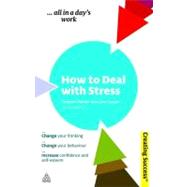
Stephen Palmer, PhD, is one of the UK's most influential experts on stress management. He is Founder-Director at the Centre for Stress Management and Honorary Professor of Psychology at City University, London. He has written or edited over 30 books on stress management, psychotherapy and coaching.
Cary Cooper, PhD, CBE, is Professor of Organisational Psychology and Health at Lancaster University, President of the British Association of Counselling and Psychotherapy, past President of the British Academy of Management and the author of numerous books, including Business and the Beautiful Game and Shut Up and Listen (both published by Kogan Page).
| Acknowledgements | p. ix |
| Introduction | p. 1 |
| What is stress? | p. 7 |
| Simple definition | p. 7 |
| Pressure and stress | p. 8 |
| Costs of stress | p. 10 |
| How do you cope with stress? | p. 15 |
| Axe you in control? | p. 18 |
| Health locus of control | p. 20 |
| The biology of stress | p. 21 |
| Summary | p. 25 |
| A working model of stress, coping and resilience | p. 27 |
| A model of stress, coping and resilience | p. 28 |
| Helpful versus unhelpful troublesome negative emotions | p. 36 |
| Important: choice of interventions | p. 39 |
| Summary | p. 40 |
| Changing your thinking | p. 41 |
| Changing your thinking: it isn't a modern concept! | p. 41 |
| As simple as ABC! | p. 42 |
| Thinking errors | p. 46 |
| Helpful challenging questions | p. 61 |
| ‘Pros and cons’ | p. 70 |
| Stress thought record | p. 74 |
| Dealing with your own anger | p. 77 |
| Overcoming the self-esteem trap | p. 81 |
| Accepting others but not their behaviour | p. 84 |
| Inference chaining | p. 86 |
| Summary | p. 89 |
| Changing your imagery | p. 91 |
| Coping imagery | p. 92 |
| Self-motivation imagery | p. 93 |
| Staying focused (or goal) imagery | p. 95 |
| Time projection imagery | p. 96 |
| Relaxation imagery | p. 97 |
| Anti-craving imagery | p. 98 |
| Summary | p. 100 |
| Changing your behaviour | p. 101 |
| What type are you, A or B? | p. 101 |
| Social support | p. 104 |
| Assertiveness training | p. 107 |
| Assertiveness rights | p. 109 |
| Assertiveness skills | p. 110 |
| The three-step model of assertion | p. 111 |
| Time management | p. 113 |
| Top tips for the time manager | p. 115 |
| Developing goals | p. 116 |
| Summary | p. 118 |
| Improving your physical health to help you conquer stress | p. 119 |
| Alcohol | p. 121 |
| Caffeine | p. 123 |
| Exercise | p. 124 |
| Nutrition | p. 125 |
| Weight control | p. 129 |
| Smoking | p. 131 |
| Relaxation | p. 131 |
| Summary | p. 138 |
| Dealing with work-related stress | p. 141 |
| Definition of stress | p. 142 |
| The financial and health impact of work-related stress | p. 142 |
| How do you cope with stress at work? | p. 147 |
| The unfit manager | p. 149 |
| The fit manager | p. 151 |
| Work-related stress risk assessment and interventions | p. 153 |
| Before you start a work-stress risk assessment | p. 157 |
| A comprehensive approach | p. 162 |
| What can you do? | p. 165 |
| Summary | p. 166 |
| Stress self-audit | p. 167 |
| Developing your own action plan | p. 171 |
| ‘Stress carriers’ | p. 171 |
| Home-work interface | p. 172 |
| Action plan | p. 173 |
| Sample stress management action plan | p. 174 |
| Start now | p. 177 |
| Summary | p. 178 |
| Appendix | p. 179 |
| References and bibligraphy | p. 185 |
| Useful organisations | p. 189 |
| Table of Contents provided by Ingram. All Rights Reserved. |
The New copy of this book will include any supplemental materials advertised. Please check the title of the book to determine if it should include any access cards, study guides, lab manuals, CDs, etc.
The Used, Rental and eBook copies of this book are not guaranteed to include any supplemental materials. Typically, only the book itself is included. This is true even if the title states it includes any access cards, study guides, lab manuals, CDs, etc.